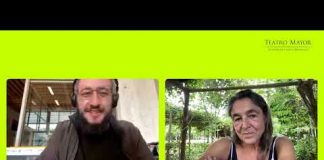John Paul Lederach, Kroc Institute:
“I’m thankful for both the Truth Commission and the international support that you’ve given them. It’s been an honor for me to be able to accompany the Commission. My vocation’s been peacebuilding throughout these 4 decades, many of them in Colombia.
I noticed the parallel that exists between peacebuilding and the search for truth, because they must face very specific challenges. Particularly the challenge of knowing how to listen. However, the Commission’s main challenge was knowing how to listen to a whole country. Some may ask “And why is it significant to listen to a whole country?”. Well, 60 years of war tells us there is no way ahead of it. To build a future, one must ignore what one has suffered and the trauma it brings for a country’s population.
The parallel is related to key questions: How can history be remembered, how can the past be understood, and envision a different future. How exactly? Finding a way, which is what they’ve done as an important peacebuilding is truth-seeking work at the local level. Can it connect with what’s happening nationally? In other words, how to reduce the distance between what’s been experienced locally and what’s happening at the national political level. The third question is almost always present: What are the conditions that allow us to respect the plurality of a country and encourage nonviolent dialogue? Meaning, how to sustain coexistence without violence.
This was the main mandate of the Commission to acknowledge and clarify. And from their experience, important hints on how to listen to a country are emerging. I think there are 3 remarks that we see in the example of Father Pacho and the commissioners in their duty, which give us some important steps of this process in recent years. First: When we address the question “Why is listening meaningful?” the first thing that emerges is that deep listening is the only thing that can bridge the gap between knowing and acknowledging. We may know what has happened but we don’t always acknowledge it legitimately, publicly and collectively.
The difference between knowing and acknowledging is that acknowledgment grants dignity by indicating and acting openly, collectively and with all the public validity, and succeeds in telling the victims “We see you, you are not invisible, we acknowledge your suffering, we acknowledge what you have told us about your experience, and what happened to you was neither humane nor just.” Dignity is expressed by rendering visible and acknowledging what they have lived through.
The second hint we get from that Commission: Transformative listening is the one that chooses to reach out and spend some time around. Just as our friends in Alta Montaña, in Montes de María, always told me: “Peace without haste. Listening without haste”; when one has a chance to feel the authenticity of those who are listening, and to feel the human warmth at that moment, which manages to grasp what St. Benedict always said was the ability to “incline the ear of the heart”.
That kind of listening that reaches out and spends time with suffering communities, is the only kind of listening that helps create collective empathy. It’s the only one that bridges the gap between the local level and the national level. Right here is where we have witnessed the labor of this Commission. Through its Houses of Truth. Through its thousands and thousands of interviews. Through the trips they made all over the territory; if not the whole world, in the countries where there are exiles. Through the meetings they facilitated between victims and perpetrators. The closeness where acknowledgment and accountability go hand-in-hand, creates the indispensable link to humanize the legacy of the conflict. Finally, the last hint we get to see: While we think that dialogue is about talking and chatting, the foundation that sustains dialogue over time always goes back to the listening quality experienced.
As they used to say many years ago among the communities of Magdalena Medio, their pledge, at first, always was: “We will understand those who do not understand us”. Even in a context where they had to confront armed groups. The first rule of sustained dialogue is not to listen to find weaknesses in the other’s argument. Rather, it is listening to understand what they have lived through. In essence, deep, patient, disciplined listening. That’s the basis that creates and sustains coexistence without violence.
And these 3 qualities, in those years of the Truth Commission in Colombia, to reach out, to visibilize and to listen in order to understand, provide the way to re-humanize the conflict, and strengthen the lasting foundation of the search for truth and the moral imagination necessary for peacebuilding. For this reason, both Colombia and the international community can affirm that we are deeply grateful to the Commission and all the people who have supported its efforts.


